Arizona reports record new high of Covid-19 cases and deaths
From CNN’s Konstantin Toropin
Ahead of Vice President Mike Pence's trip to Arizona today, the state is reporting 4,878 new cases of Covid-19 as well as 88 deaths from the disease over the last 24 hours, state data shows.
Today’s numbers are a new record high for both new daily cases and deaths since the state started posting data publicly in mid-March.
The state’s Department of Health acknowledged the record highs today in a tweet.
“Today Arizona will be reporting record highs for reported new Covid-19 cases and deaths,” the department tweeted.
“The virus is widespread in Arizona,” it added.
The state is also reporting a record high 89% of ICU beds being used by those with the disease.
The previous record highs were 3,591 new cases of Covid-19 on June 23 and 79 daily deaths on June 24.
Pence is traveling to Phoenix today to meet with Gov. Doug Ducey about his state’s recent rise in coronavirus cases. He is expected to speak to the press at 3:35 p.m. ET.
Here is a look at the progression of new Covid-19 cases in the state, according to John Hopkins University data:
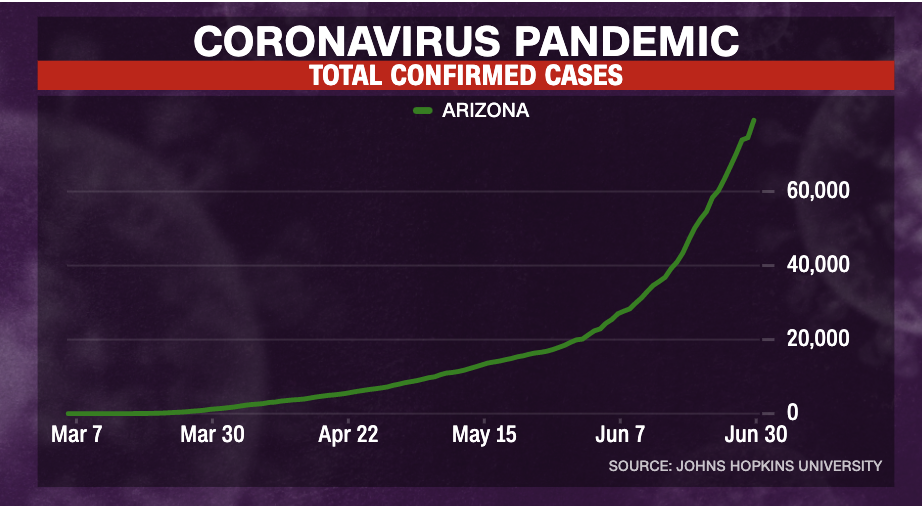
"I'm not sure what more we can do, short of a total shutdown," Arizona mayor says
From CNN's Adrienne Vogt
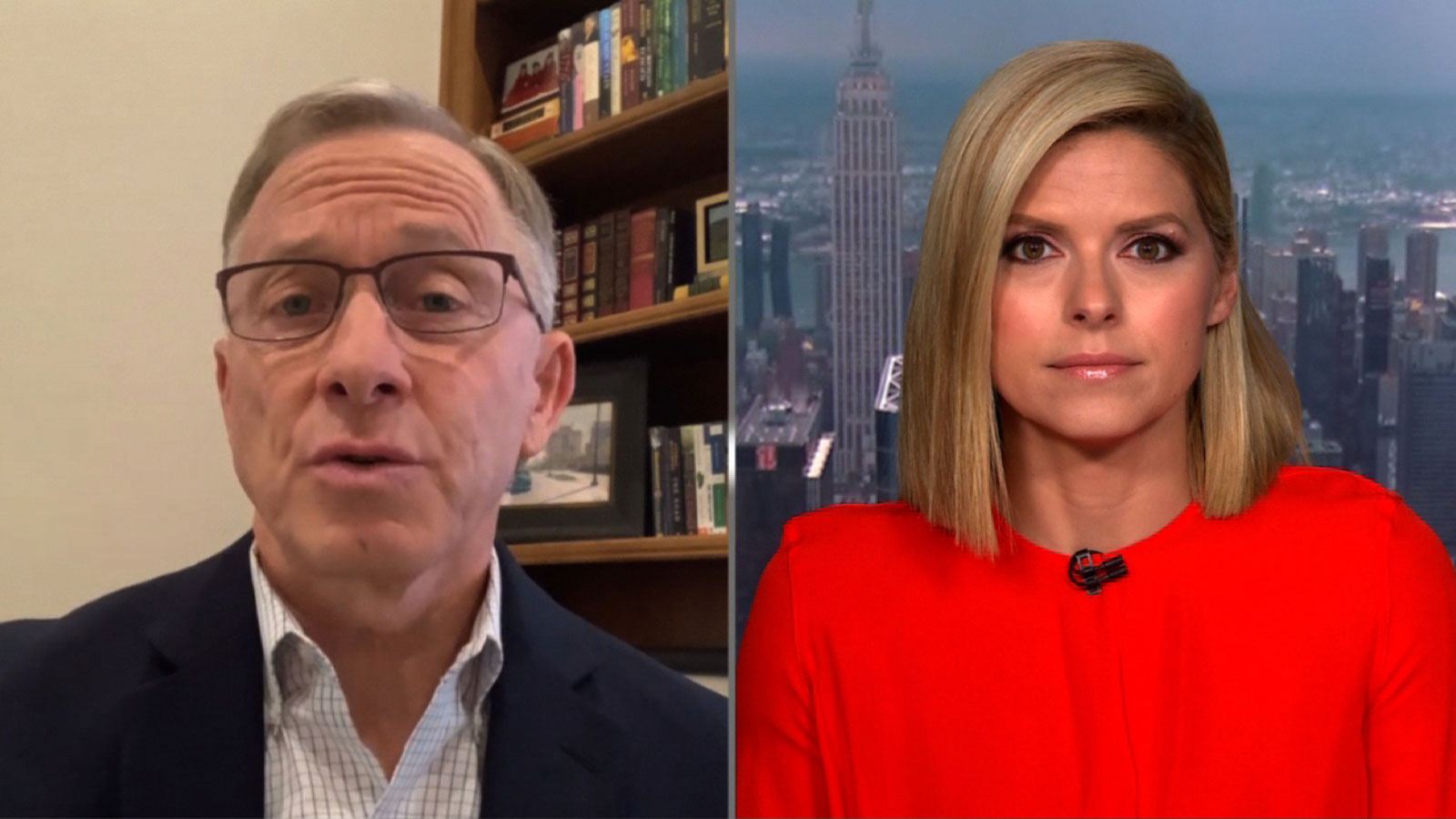 Mesa, Arizona Mayor John Giles speaks with CNN's Kate Bolduan on July 1. CNN
Mesa, Arizona Mayor John Giles speaks with CNN's Kate Bolduan on July 1. CNNAfter Arizona closed gyms, bars and theaters, Mesa Mayor John Giles said he doesn’t think it’s enough to reverse the spike of coronavirus cases.
I’m not sure what more we can do, short of a total shutdown,” Giles said to CNN’s Kate Bolduan, adding that he expects numbers to climb.
ICU beds in the state’s largest hospital are at about 90% capacity, he said. A quarter of hospitalizations are people 22 to 42 years old.
The Republican mayor said it “would be a very positive step” if President Trump started wearing a mask in public.
“Modeling good behavior, I think, would help us and help people get over this perception that there's some sort of a political statement attached to wearing a mask,” he said.
Vice President Mike Pence is traveling to the state today and will be meeting with Arizona Gov. Doug Ducey.
The city has a mask mandate in place and is following CDC recommendations, Giles said. Residents are mostly following guidelines, but he added that there were some “growing pains.”
“We had some pushback, and some of it was the unfortunate political pushback that you've seen in other areas of the country as well,” he said.
Florida reports another 6,500 new coronavirus cases
From CNN's Tina Burnside
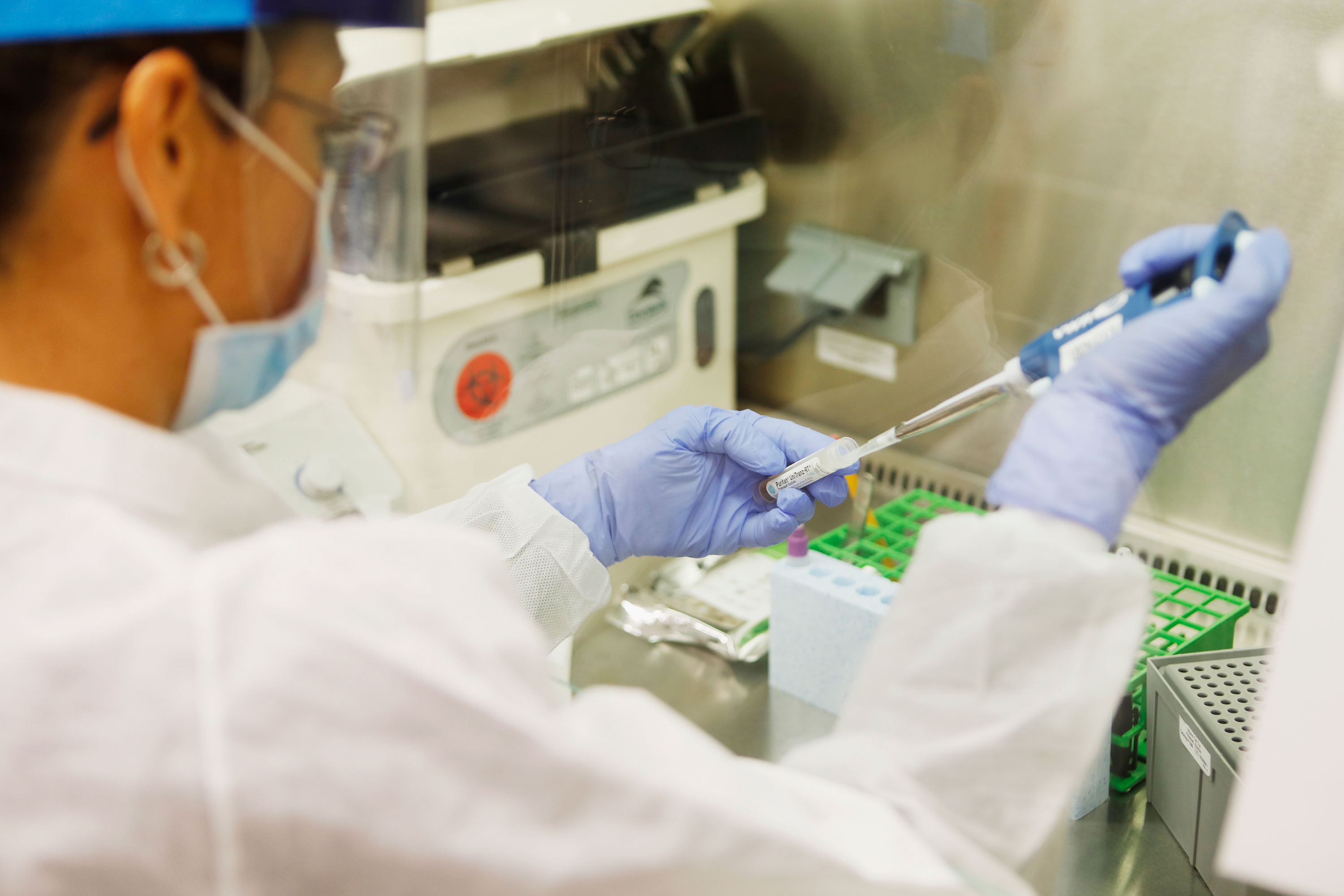 A medical technologist processes coronavirus test samples at the AdventHealth Tampa labs on June 25 in Tampa, Florida. Octavio Jones/Getty Images
A medical technologist processes coronavirus test samples at the AdventHealth Tampa labs on June 25 in Tampa, Florida. Octavio Jones/Getty ImagesThe Florida Department of Health is reporting 6,563 additional coronavirus cases, bringing the state total to at least 158,997, according to data released by the state on Wednesday.
Today's new daily total is up slight from yesterday's — a little more than 6,000 new cases. The state reported its highest ever daily case count on Saturday, with more than 9,500 new cases.
Here's is the breakdown of coronavirus cases in the state of Florida since Friday:
Official US Covid-19 death count could be an underestimate, study says
From CNN Health’s Jacqueline Howard
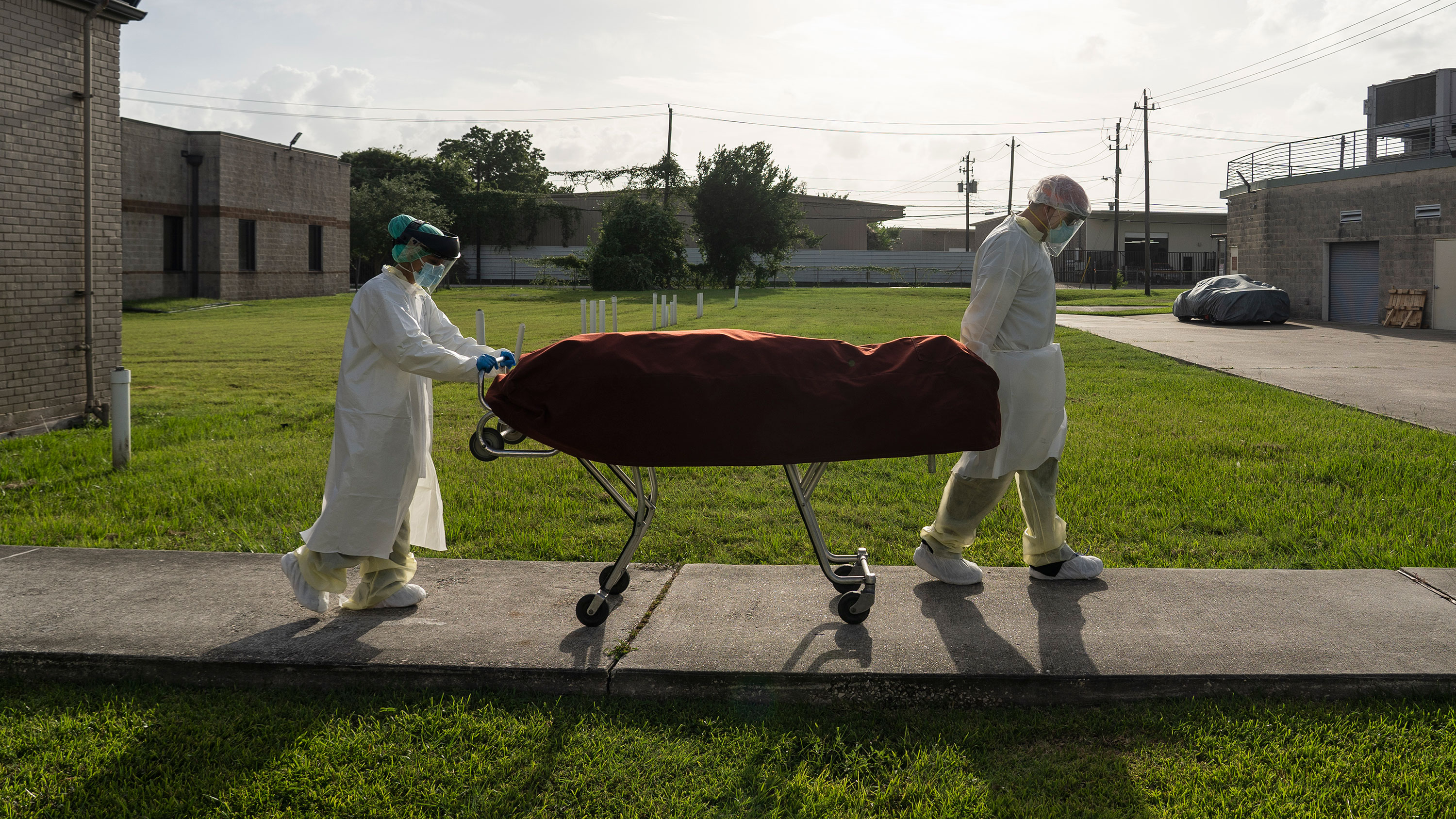 Medical staff push a stretcher with a deceased patient outside the Covid-19 intensive care unit at the United Memorial Medical Center on June 30 in Houston, Texas. Go Nakamura/Getty Images
Medical staff push a stretcher with a deceased patient outside the Covid-19 intensive care unit at the United Memorial Medical Center on June 30 in Houston, Texas. Go Nakamura/Getty ImagesOfficial Covid-19 death counts in the United States may underestimate the full rise in fatalities linked with the pandemic, according to a new study.
The new study, published in the journal JAMA Internal Medicine today, found that the number of excess deaths that have occurred so far during the pandemic, between March and May, is actually 28% higher than the nation’s official number of deaths attributed to Covid-19.
The researchers added that, "As the pandemic has progressed, official statistics have become better aligned with excess mortality estimates, perhaps due to enhanced testing and increased recognition of the clinical features of Covid-19."
What researches studied: The new study included data from the National Center for Health Statistics on deaths due to pneumonia, influenza and Covid-19, as well as deaths from any cause.
The researchers — from Yale University, National Institutes of Health, Aledade Inc., University of Massachusetts Amherst and Roskilde University in Denmark — used that data to examine how many deaths were due to any cause each week between March and May this year compared with in previous years.
They also examined how many deaths were due to Covid-19 during that same time period.
What the data showed: The researchers found that there were about 781,00 total deaths in the United States from March 1 to May 30, representing 122,300 more deaths than would be typically expected at that time of year compared with previous years.
Meanwhile, there were 95,235 reported deaths attributed to Covid-19 between March and May — a tally less than the total number of excess deaths, the researchers found. The data also showed that the deaths and completeness of death counts vary “markedly” between states.
Limitations of the study: Analyses were based on provisional data, and are subject to being incomplete due to delays in reporting deaths that have occurred.
Also, "the number of excess deaths reported herein could reflect increases in rates of death directly caused by the virus, increases indirectly related to the pandemic response (eg, due to avoidance of health care), as well as declines in certain causes (eg, deaths due to motor vehicle collisions or triggered by air pollution)," the researchers wrote in the study.
"Further work is needed to determine the relative importance of these different forces on the overall estimates of excess deaths," they said.
Some context: Certain US officials have raised concerns that deaths not caused by coronavirus have been improperly attributed to Covid-19, while others have been worried that the nation’s Covid-19 death toll has been undercounted.
Health experts have long warned that the national count of Covid-19 deaths in the US could be underestimated.
When it comes to an accurate count of Covid-19 deaths in the US, "we really are just seeing the tip of the iceberg and a lot of it has to do with the tests we have available," Dr. Panagis Galiatsatos, a pulmonary and critical care physician on the front lines at Johns Hopkins Medicine in Baltimore, told CNN in April.
Yale to require weekly testing for undergrad students during the fall semester
From CNN's Elizabeth Hartfield
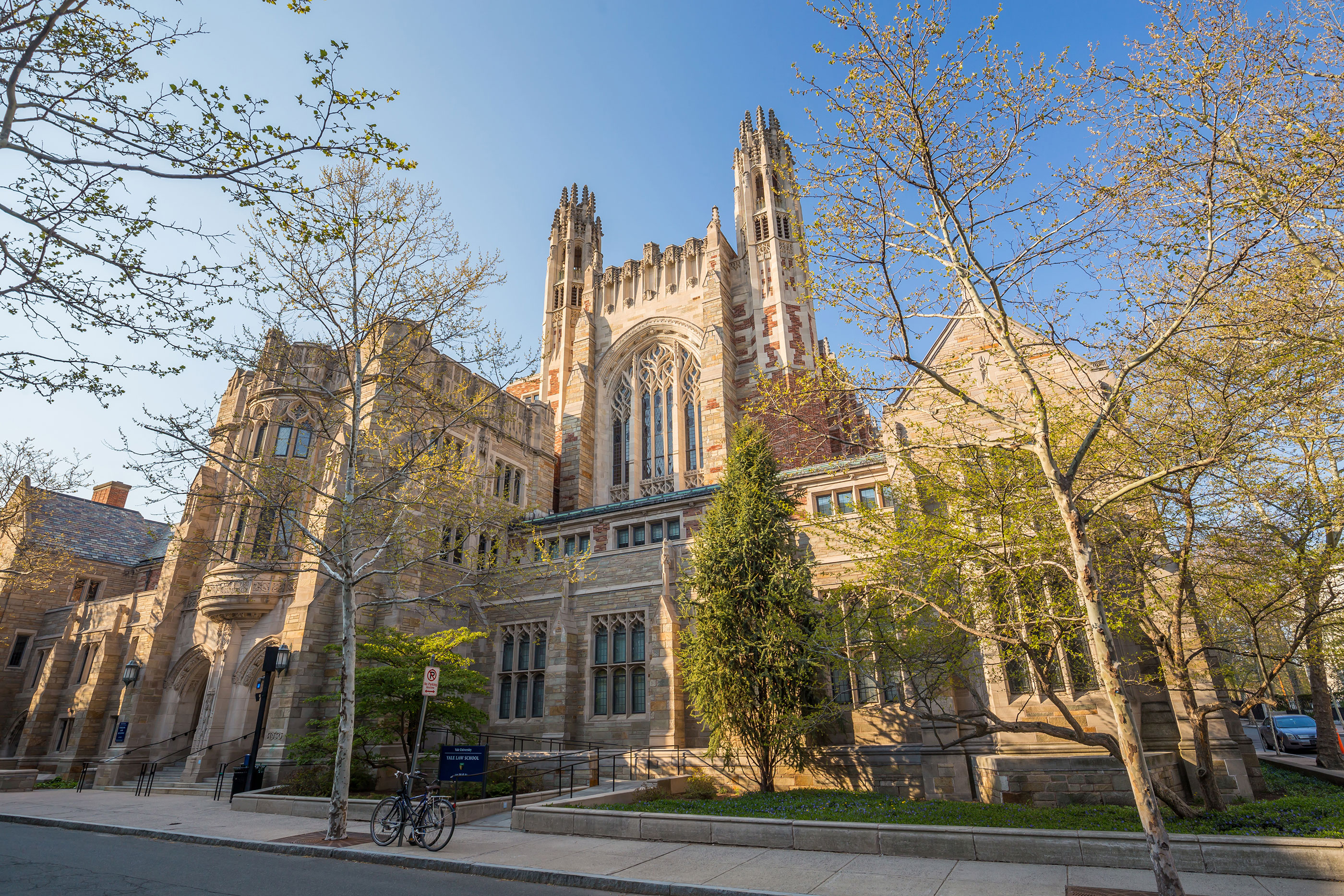 Yale University Shutterstock
Yale University ShutterstockYale University will require extensive testing for students and faculty returning to campus this fall semester, the school's president announced in a letter.
Yale will also require all faculty, "who will be on campus during the fall term ... to be tested for Covid-19 at the start of the semester," the letter reads.
The school says that some faculty may be required to be tested weekly "depending on their Yale duties."
Here are other measures the university will be taking:
Why the "dimmer switch" approach to pausing reopening won't work in Arizona, Florida and Texas
From CNN's Gisela Crespo
The "dimmer switch" approach to reopening some mayors and governors are taking to contain the spread of coronavirus will not work for areas of the country seeing a large increase of new coronavirus cases, according to Erin Bromage, an an associate professor of biology at the University of Massachusetts Dartmouth.
The so-called dimmer switch technique allows places to gently slow down on reopening, such as easing up on restaurant restarting, but it only works in places were coronavirus numbers are under control, Bromage said on CNN today.
Some places where coronavirus numbers are rising — like Arizona, Texas and Florida — need a hammer instead of a switch to control new cases, Bromage said.
"The dimmer switch approach works when you have case numbers under control," Bromage told CNN's Jim Sciutto. "We saw New Jersey, we saw New York governors both say we might slow down on reopening restaurants — that's a dimmer switch."
Bromage continued:
"When you get into Arizona numbers, Texas numbers, Florida numbers, that tiny adjustment that you make is not going to have the effect on turning those new infections around fast enough. You've gotta come in with more of a hammer rather than a switch to control this now."
Covid-19 vaccine from Pfizer and BioNTech shows "encouraging" data in early study
From CNN Health's Jacqueline Howard
The Covid-19 vaccine candidate being developed by US pharmaceutical company Pfizer and German biotechnology company BioNTech has yielded positive data in early tests, according to data released by the companies.
The companies announced these preliminary findings on Wednesday in a pre-print paper that shows participants in a Phase 1/2 study of the vaccine, called BNT162b1, responded to the immunization and it was found to be well tolerated. The Phase 1/2 study is ongoing. The data has not yet been published in a peer-reviewed medical journal.
How the study was conducted: For the initial study, 45 participants ages 18 to 55 were randomly assigned to either receive a certain dose of the vaccine or placebo.
Twelve participants received two 10 microgram doses 21 days apart; 12 received two 30 microgram doses 21 days apart; 12 received a single 100 microgram dose on day one; and nine received placebo, according to the study.
In the seven days following injection of the vaccine, some participants who received a dose reported pain in the injection site, fever or sleep disturbances, but "no serious adverse events were reported," according to the paper.
Early results of the study: The researchers found that the vaccine generated antibodies against the coronavirus in all of the participants by 28 days after receiving a single injection of 100 micrograms or seven days after receiving a second dose of either 10 or 30 micrograms.
"These preliminary data are encouraging, showing that BNT162b1 which exploits RBD SARS-CoV-2 as a target antigen is able to produce neutralizing antibody responses in humans at or above the levels observed in convalescent sera – and that it does so at relatively low dose levels. We look forward to providing further data updates on BNT162b1," Dr. Ugur Sahin, CEO and co-founder of BioNTech, said in a company press release on Wednesday.
Pfizer and BioNTech announced on Wednesday that this preliminary data will help them determine a dose level for the vaccine then select which of their multiple vaccine candidates to progress to a larger-scale global Phase 2/3 study, possibly beginning as early as this month.
According to the World Health Organization, there are 17 coronavirus candidate vaccines in clinical evaluation globally.
New York City is reopening its beaches today, mayor says
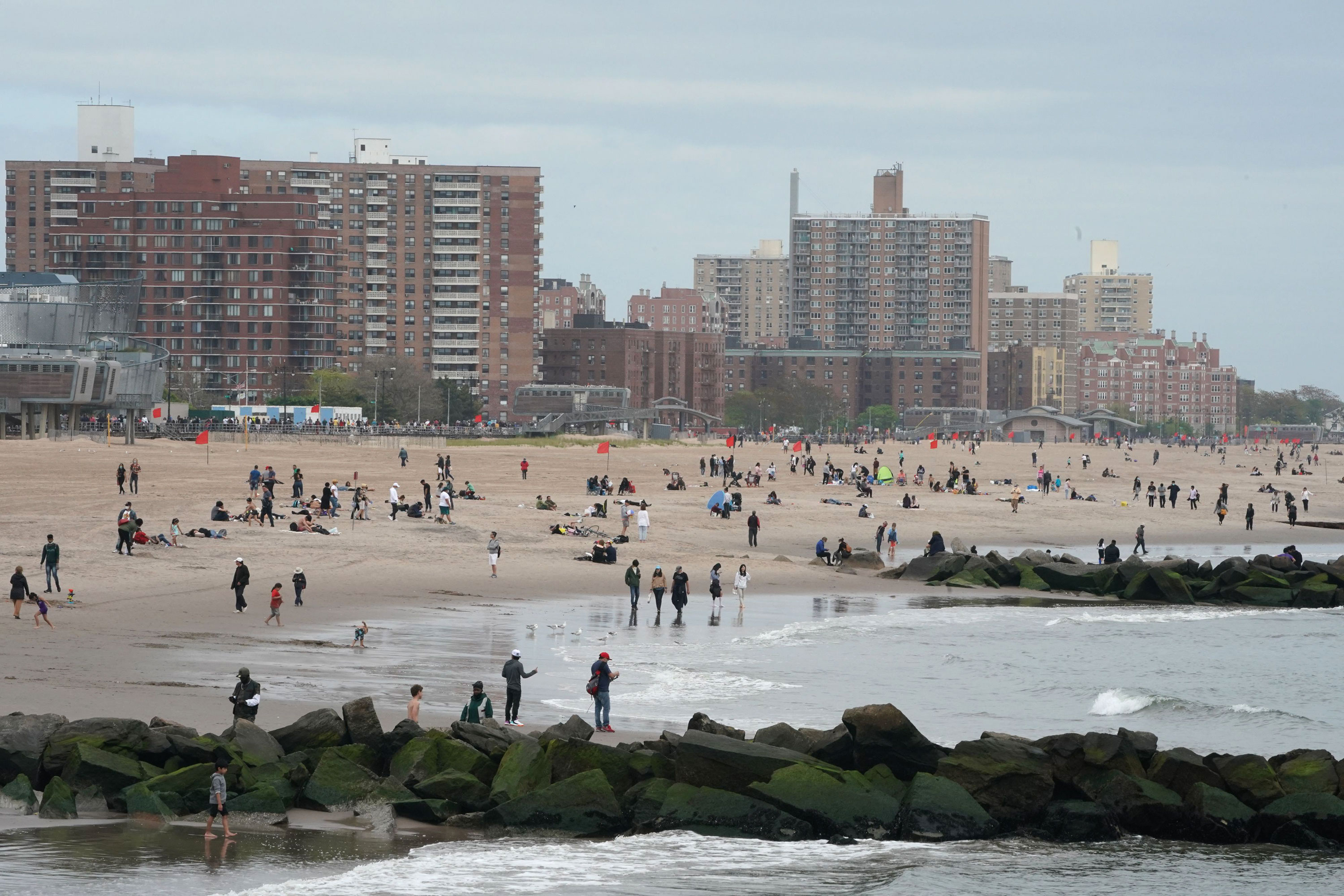 People gather on a beach at Coney Island on May 24 in New York. Bryan R. Smith/AFP/Getty Imagses
People gather on a beach at Coney Island on May 24 in New York. Bryan R. Smith/AFP/Getty ImagsesNew York City Mayor Bill de Blasio said that city will open its beaches.
"Our New York City beaches open today," he said.
He added that 15 public pools in the city will open in the next few weeks
He said that people at the pools will be required to wear face coverings when not in the water. He said that the pool experience is going to be different but "it'll all be worth it."
Here are the pools that will be opening in NYC in the coming weeks:
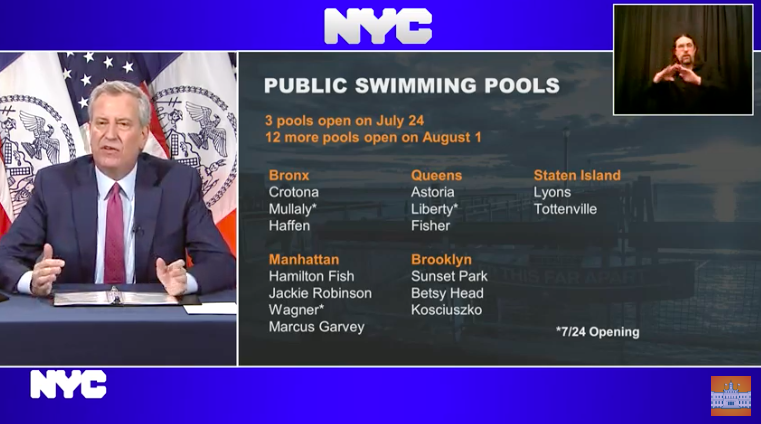
New York City mayor says reopening indoor dining will be postponed
New York City Mayor Bill de Blasio said the city will mot move ahead with plans to reopen indoor dining next week.
"It is not the time to forge ahead with indoor dining," de Blasio said at a news conference.
Restaurants were set to resume indoor service on Monday as the city enters its third phase of reopening. De Blasio did not say when indoor dining will resume in the city.
The mayor said outdoor dining — which began last week — will continue. He said he is "very convinced" New Yorkers can help restaurants survive by dining outside.
"Outdoors is working — period," he said.

 5 years ago
670
5 years ago
670 

